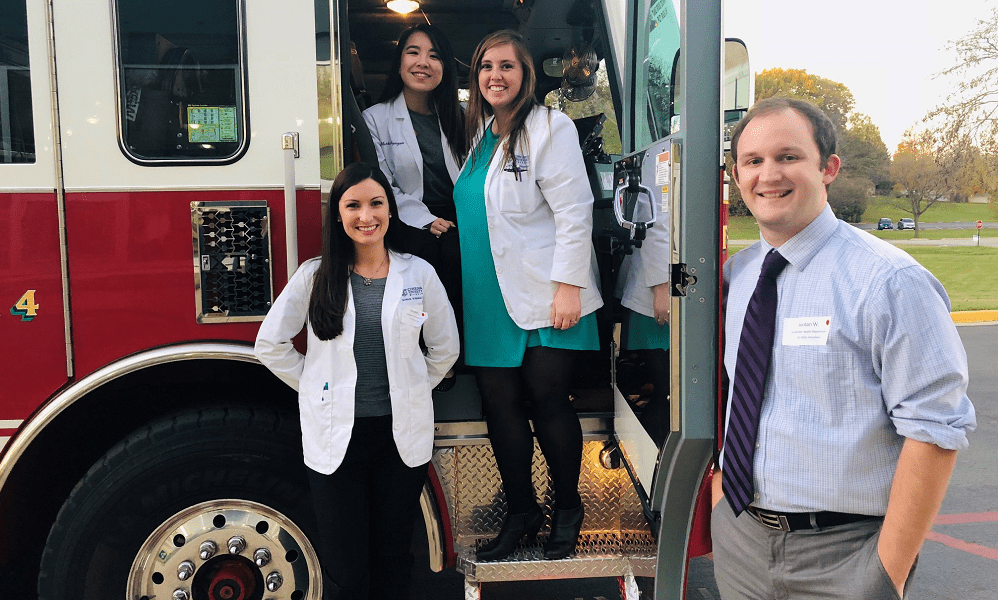 Dr. Wulz and Students
Dr. Wulz and Students While many pharmacists still serve behind counters to fill prescriptions, the overall role of pharmacists in the medical field has expanded significantly over the last few decades. One such expansion of pharmacy practice is in public health. Not only can pharmacists shape an individual’s personal experience with medications, but pharmacists can also create major positive community change.
Dr. Jordan Wulz, an assistant professor of pharmacy practice at Concordia University’s School of Pharmacy, is doing just that—creating positive community change through his work to reduce substance abuse in local communities.
Specializing in pain management and public health, his latest effort includes representing Concordia University on the Hales Corners and Greendale Community Alliance Coalition’s Drug-Free Community Grant. Just recently, the White House Office of National Drug Control Policy awarded the Community Alliance a $625k grant to expand their work in Hales Corners and Greendale. Dr. Wulz shares his experience:
“After spending time in Florida and Alabama for my training and education, I was hired as a pharmacy professor at Concordia University Wisconsin. As a result, I had the privilege of moving back to my hometown of Greendale, WI. As a pharmacist specializing in pain management and public health, I became passionate about finding ways to combat the opioid crisis as a pharmacy professional as well as in my personal life. Fortuitously, the Greendale and Hales Corners Health Department put out a call to host a community discussion on a number of substance misuse and abuse issues affecting each community only a month after I moved back. From this meeting, the Community Alliance was formed with the mission of preventing substance misuse, reducing negative social stigma connected to addiction, and helping individuals and their families identify addiction treatment/recovery resources.”
Wulz group
Creation of the Community Alliance
The Community Alliance was created in 2017 after a report found stark increases in local opioid-related hospitalizations and deaths, youth marijuana use, adult binge drinking, and electronic cigarette use. Over the last two and a half years, the coalition has held monthly meetings focusing on their aims, and developing partnerships in the community between the school districts, police and fire departments, health department, neighboring coalitions, and religious entities like the Hales Corners Lutheran Church. As a result of these partnerships, the Alliance has put together a number of successful events including the first and second annual Community Wellness Event hosted at the Greendale High School.
Community Alliance Sees Success
These events have seen upwards of 300 participants and each year has had a theme related to substance abuse including the “Opioid Crisis” and “Mental Health” in its first and second iterations, respectively. These wellness events start with a resource fair to help connect residents to wellness, mental health, and substance abuse organizations and end with a keynote speaker or expert speaker panels.
Dr. Wulz has been involved in the planning of both events and, as a pharmacist, served as an expert speaker at the first annual event on the opioid crisis. Third-year pharmacy students from Concordia participated this past year and presented posters on new drugs of abuse including Kratom and fentanyl analogs. This upcoming year, the theme will be connected to marijuana use and abuse among youths, and Dr. Chris Cunningham, an associate professor in Concordia’s School of Pharmacy will be the keynote speaker.
Expanding the Community Alliance
These events are just a few examples of the work that the Community Alliance has done. Thanks to the Drug-Free Community grant, that work will be expanded upon as the Alliance teams up with representatives from 12 different sectors including law enforcement, school districts, health departments, among others. Dr. Wulz serves as one of the 12, representing CUW’s School of Pharmacy as an organization involved in reducing substance abuse.
The Alliance’s current 12-month Drug-Free Community action plan includes strategies to increase collaboration, coordination, and community-based networking to prevent youth substance abuse as well as reduce the rate of substance abuse currently occurring in the local youth population. As a pharmacist, Dr. Wulz will be able to continue providing valuable medication expertise for the group to draw from, particularly in pain management, and substance abuse.
To learn more about the Community Alliance’s work and the $625k grant, check out Patch’s coverage of the Community Alliance.
To learn more about the School of Pharmacy, visit www.cuw.edu/pharmacy
—
If this story has inspired you, why not explore how you can help further Concordia's mission through giving.